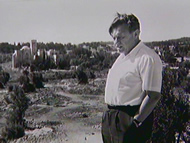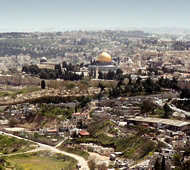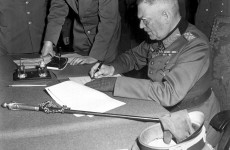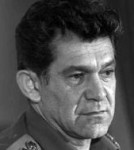Teddy Kollek: ‘The world will always continue to be worried about the faith of Jerusalem’

In 1971, four years after the reuniting of the city of Jerusalem in the Six-Day war, reporter Arnold Forster interviewed Teddy Kollek, then Mayor, for Dateline Israel . Kollek regarded the issues of the development of the newly formed city, which at the time received world attention and was highly controversial.
Interview with Teddy Kollek from 1971 – interviewer: Arnold Forster.
Transcript of interview:
This is Arnold Forster in Israel. In reuniting the city of Jerusalem and taking custody of it after the Six-Day war, in June ’67, the Jews of Israel achieved a two thousand year old dream. Unhappily, not everyone everywhere is glad this has happened.

Q: Jerusalem is a city that has been fought over more than every other on earth, and occupied by every manner of conqueror over the long centuries since the Jews were first dispersed from it. Today people living in this ancient city, others from neighboring countries and even from distant lands, all watch closely how it’s being administered, build, changed by the Israeli. Everyone feels a direct interest and concern about this historic place. But Jerusalem is also a modern municipality, with all the attended problems of population growth. And as cities the world over, it must face and meet ever growing housing demands. Recently, three new developments were proposed in the area of its surrounding hills, and naturally a controversy developed. To get the whole story, I talked to its world famous mayor – Teddy Kollek:
A : Well, Jerusalem is a growing city, and we are trying to keep it small. We have no ideal of creating a metropolis of millions here. This should be a spiritual metropolis and we are trying to restrict growth here. But we see a natural growth here. The natural growth is based on a very large birth rate amongst the Jews, who are mainly refugees from Arab countries, and an even greater birth rate amongst the Arabs in the city. The 70,000 Arabs here have, I believe, the highest net birth rate anywhere in the world. We have an idea that about the turn of the millennium, or maybe a decade later, we shall be from the 300,000 now maybe 500,000. It’s not a tremendous growth, but it is a serious growth. What we have in mind is that a city of 500,000, in 2010, will have a certain attraction for the cities around.
Q : Where exactly are these three controversial developments to be situated?
A : Well, they are all within the parameter of Jerusalem.
Q : On the edge?
A : Two of them are entirely contiguous with present day building. One to the south east, one to the south west, and one is farther away, and as the minister of housing has said, that this particular unit, of about 600 families far out in the north of the city, has a strategic implication.
Q : Well, are these three developments for Jews only or are they for anybody who lives in Israel?
A : These units are for Jews only, because we have an entirely different concept than you of cities. We have no ideal of a melting pot. We don’t want to mix Armenians and Greeks who have lived here for 1500 years, for 1800 years, and Arabs, and Jews, and they have all kept their identity. All these centuries – suddenly into one melting pot. The melting pot ideal in the United States hasn’t been so successful anyway. We are building houses for Arabs, continuous to Arab areas – to Arab suburb that exist in the city. We have given loans to well over a thousand Arabs so far – mortgages, long terms, subsidized mortgages, to a thousands Arabs to build. But these are not under an argument, because everybody is accustomed to the Arabs being here all the time. The world has to get accustomed to this being the capital of Israel, and the Jews moving in.
Q : If the three contested developments are on the periphery of Jerusalem, and they all face the Arab nation, is the criticism that’s coming with respect to the proposals not architectural, but rather political?
A : Well, I believe it’s both. I have an argument with the ministry of housing over one of these units, because it is too far away, and it will be costly for the city to give services there. I have also a general argument with the ministry of housing because I say. or the government, because I say that at the same time as you build new suburbs you have to do more for the poorer areas of the city, otherwise you will create social tension. You can’t build the city only out of new suburbs, at the same time you have to relieve the density of dwelling today in the city. We are suffering from bad housing conditions. We have four times more families of seven members and above than the rest of the country – Jews and Arabs alike. And we have to bring relief to those. So my argument is: before you go on building new buildings, or while you are going on to build new buildings, add more money in order to do well by those who are already here in the city.
Q : You talk about Jerusalem in the future as if there were no question whether it will continue to remain reunited and permanently the capital of Israel. Isn’t that the basis for the criticism? If the properties that are now being developed or planned to be developed are strategically located, will not their completion help fortify Israel’s position that Jerusalem will never again be divided?
A : Maybe that is so, but I think it’s a very weak argument.
Q : Why?
A : If tomorrow something would happen, which I am perfectly convinced will not happen, and the city will be divided again, and 650 housing units, and this is the argument we are now having, will remain within an Arab entity, what harm is there. done by this? There are 300,000 or 350,000 Arabs living today in Israel – in Haifa and in Nazareth and in a variety of other places. So what harm in 650 families here or a 1000 families there of Jews living in Arab country? No harm whatsoever.
Q : Supposing peace would have come tomorrow – real peace with the Arabs. Would the state of Israel still insist on building the three contested developments precisely where they are scheduled now to be built?
A : Two of them, certainly. Two of them, no doubt. And. they fit very well in the landscape and there is no argument about them architecturally as well. One of the areas is called the area near government hill. Now, government hill has two slopes. One is a very beautiful green area which you see from the old city, and everybody, when you speak about government hill, thinks that we are building the houses on this green slope, which forms one unit practically, going up over a deep valley to the walls of the old city. Now – this green hill will remain green. We have given the planning of this area as a park, maybe one or two public buildings in it or so, to one of the greatest architects alive, to Louis Kahn, who is the dean of American architects – there is a dean of American architects. And we asked him to work out the program for this, which would preserve this area, fitting for the landscape for the visual heritage of Jerusalem. We are building on the other slope, which you don’t see from Jerusalem at all, which goes towards the Dead Sea. These houses, moreover, are well planned and will fit in to the slope, will not stick up beyond the hill. So I have no argument there. And they have easy connections with the city. Similarly, the one which I have the main argument with is called Nebbi Samuel. There is a hill, very beautiful, with a mosque on top, which was build over the. supposedly the grave of the prophet Samuel. Now this hill will remain beautiful and empty, because the nearest house now being planned is two miles from that hill. So you won’t see it even in connection with that hill. But because at some time or other this place was called Nebbi Samuel, everybody who has the visual picture of Jerusalem in mind thinks that these houses are going up on that hill. So I believe the esthetic argument is less severe by far than it is made out by people who don’t really know the facts but have sprung to conclusions.
I had a friend here from New York the other day, a gentile who came here and had read all these arguments and said: “Now, I would like to see where these high-rise apartments are going up”. And he was looking for them somewhere between Gethsemane and the Holy Sepulchre. Now, they are not near Gethsemane, and they are not near the Holy Sepulchre. They are far out, and they are not high-rise in the sense of what you call “high-rise” in the United States. They are four stories high: ground floor and three floors walk up. So the argument is not as serious as you make it.
Q : Is it possible, mister mayor, that the argument that it’s not artistically correct is just a dodge to hide behind a political objection to the building of the three developments?
A : Maybe subconsciously that is so, but I believe that people in the world are worried about what Jerusalem will look like in twenty, or thirty, or forty years. We are ourselves worried, because we were worried we invited some 25 or 30 architects and town planners from all over the world – from as far away as India, and San Francisco, and Scotland, and England, and Holland, and Italy, and France, and Germany to look at this, and we got a great deal of controversial advice, a great deal of criticism, but I believe this is the first time that a city, at all, has invited people from the outside to an open discussion, not to a private caucus, and it only shows how much we are concerned for the faith of the city architecturally, and how much respect we have for the world as a whole.
Q : You are saying. you are saying you believe that the outside world has a right to participate in the decisions with respect to the housing plans and the physical future of Jerusalem.
A : No. I don’t believe they have a right as far as decisions are concerned. As far as decisions are concerned there is the city council, it has been elected. It has been elected by Jews, Muslims and Christians only a year and a half ago, and they are the only ones to take decisions. But I think the outside world has a right of opinion, and we have an obligation of considering this opinion.
Q : You don’t believe that there is a serious contest with respect to the artistic character of the developments?
A : Well, there is, and there will be. And it will be a continuous one, I believe, over the next 4000 years, because a city you don’t build for a day and it will continue to exist and the world will continue to be worried about the faith of Jerusalem.
Q : Mister mayor, are you so satisfied with the correctness of these three developments, that you believe Israel should continue to be willing to bear severe world sanctions for moving ahead with respect to the program?
A : Well, I don’t think a city can stop living. We have to build houses, and we have to provide housing for young people, for people who come here, we have to take care of the beauties of the city. We are building a tremendous park around the old city, and this is a living city, this is not a museum. A museum you can stop for a year or two and think about. But this is a city with all its pressures and all its ideas and you have to continue to live in it.
Q : What would you suggest are the quintessentially important things to achieve, physically, for Jerusalem?
A : Well, we have to preserve the beauty of Jerusalem. We have to preserve all its holy places, in the right setting and in the right spirit, and we are doing this. We are not touching the old city at all, to the extent that we are filling in. We are filling in scale and in stone, we are preserving the stone against all arguments of modern architects who want to build in concrete mainly, or in new building materials, and we are continuing to keep the unity of the city by stone. The beauty of the city beyond everything, I believe, and I believe it can be done and taking into consideration the needs of the population that is here today, and the needs of the population that is to come.
Q : Thank you very much, mister mayor.
And those were the views of mayor Teddy Kollek of Jerusalem, with respect to the future of this most beautiful city in the world. This is Arnold Forster, in Israel.
 Transcript by Dar Translations
Transcript by Dar Translations
972-2-6414722 | dar_doc@smile.net.il

Teddy Kollek was interviewed by Arnold Forster.
Recording is courtesy of former Knesset Member Tamar Eshel, who was the Political Advisor to Mr. Kollek and a member of the Jerusalem City Council.




